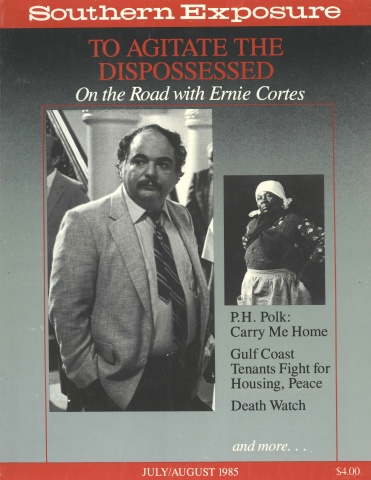Voices from the Past: To Rescue the South

This article originally appeared in Southern Exposure Vol. 13 No. 4, "To Agitate the Dispossessed: On the Road with Ernie Cortes." Find more from that issue here.
In 1936, members of the Southern Tenant Farmers Union (STFU) founded the Delta Cooperative Farm in Hillside, Mississippi. "Cooperative agricultural communities," writes Donald Grubbs in Cry from the Cotton, "the union leaders decided, were the answer." The farm moved to Holmes County in the 1940s, changed its name to Providence Farms, and lasted until the mid-50s, when leaders of the farm were put on trial "for their 'strange racial views,'" says H. L. Mitchell, a founder of the STFU. William Amberson, a Memphis doctor, was a prominent socialist and STFU supporter; he took every opportunity to publicize the advantages of cooperatives. The following is excerpted from an article which appeared in The Christian Register, March 18, 1937; Amberson's papers are on deposit in the Southern Historical Collection at the University of North Carolina-Chapel Hill.
At the very moment when interest in the Southern scene is at its peak, there is grave danger that the nation may tail once more to meet the problem with a real solution. The tenancy commissions which have been set up by the governors of Arkansas and Oklahoma, and, most recently, by President Roosevelt himself, have shown a marked tendency to favor a small individual subsistence homestead. Tenancy legislation now under discussion will almost certainly adopt such a program.
All present proposals are utterly inadequate to meet the situation. It must be remembered that at least 3,000,000 tenant families throughout America are potential candidates for rehabilitation. Of these, half live in the Southern states. A yearly appropriation of $100,000,000 will finance about 25,000 families to get possession of a small farm. This is less than one percent of the total. Meanwhile present owners are losing their farms at an even faster rate. According to a recent statement of Secretary [of Agriculture Henry] Wallace, the present rate of increase in tenant families is about 200,000 a year. All the reforms introduced under the New Deal have been unable to terminate this trend toward tenancy. The H.O.L.C. [Home Owners Loan Corporation] is now foreclosing thousands of farms and dwellings. We may shortly witness the spectacle of Resettlement Administration rehabilitating some of those dispossessed by this other branch of government. . . .
The members and trustees of the Delta Cooperative Farm are seeking to explore another way of life. We start with the recognition that, particularly in the cotton country, the small farmer is at a tremendous disadvantage in the production and marketing of his crop. We believe that powerful economic forces have been responsible for the aggregation of farm lands into larger and larger holdings. We hold that the large plantation has definite advantages which must not be lost. We seek to secure for our members every financial advantage which large operations make possible. Our land is held in trust by the trustees, who receive no part of the income. Our members are building an equity in the property through their own labors, and they will ultimately own the farm, as a co-operative group, together with all improvements which they make upon it. In their first year equity and improvements have amounted to more than $5,000 for the thirty-three families of both races already on the farm, and the average income was slightly more than $300 per family. This is a very low income, but somewhat better than the average cropper family has been getting in the past five years. As more land is cleared the productivity will of course rise.
We believe in the establishment of small villages with every house near to the store, the school, the church, and the community center. In our newly-erected community building we have radios, pianos, a medical clinic, and now a library. Night schools are open to all adult members of the co-operative. . . . The people are organized in both producers' and consumers' co-operatives. As producers, they grow the principal field crops, now cotton and alfalfa, in large fields with group operation. So far as possible we are using tractors in plowing and cultivation. A large community garden, now about to be irrigated, furnishes vegetables for the whole farm.
As consumers, the people operate a co-operative store on the Rochdale principle. In its first months it has greatly increased its stock, and paid a patronage dividend of nine percent. Our people are accustomed to dealing at commissary stores where they have often been charged as much as twenty-five cents on the dollar for credit. We pay cash wages and advance dividends, and the store runs largely on a cash basis. A co-operative council of five members directs most of the details of operation. It is elected by the whole group, every three months.
Such, in barest outline, is the Delta Co-operative Farm at the moment. . . . It stands as a challenge to the old plantation system, seeking to conserve every value which that system has developed, yet to make a fairer division of its benefits, and to release the human energies latent in even the poorest of these people when they realize that the products of their labor will not be stripped from them, but will build for them an ever richer and fuller life.